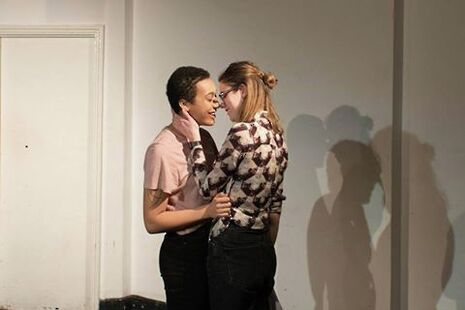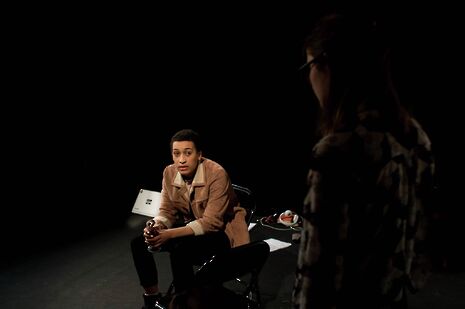Review: SCENE
“The standing ovation received by the cast on opening night ensures that this politically nuanced production will be a sure success” writes Sian Bradshaw

“People don’t like thinking about these things,” exclaims Ayo (Saskia Ross) in an impassioned declaration, defending a particular scene of a play she is writing with her girlfriend, Flo. This play-within-the-play chronicles the intricacies and difficulties of their relationship. It is both intimate and intensely polemical, and Ayo’s statement reveals much about the doctrine of the play itself.
The production focuses on the relationship of an interracial queer couple, who decide to stage a play about their partnership “in order to provide social commentary on contemporary race and gender politics.” As the pair devise the play, it becomes incredibly clear just how much of a defining factor race plays in their relationship and individual experiences of the world, culminating in the the exposing of unresolved issues.
While the play relies heavily on the ever-popular and unremitting artifice of metatheatre as its primary device for encouraging the audience to “think critically about the intersection between race, gender and sexuality,” the writing is honest and raw.
The soliloquies alone are played out with an elegant naturalism and are testament to the skill of writers, Krish and Olufemi. Despite the recent overuse of metadrama in the Cambridge theatre scene, moments where characters break the fourth wall are really beneficial to the play’s articulation of individuality. One moment in particular in which Ross steps outside the drama at large, remarking on the unthinking nature of a “white person running their hands through a black person’s hair,” the scene feels almost reminiscent of one of Phoebe Waller-Bridge’s off-the-cuff remarks in Fleabag, and is just as subtle in its execution.
“The soliloquies alone are played out with an elegant naturalism and are testament to the skill of Krish and Olufemi”
Beneath the conspicuous politicisation of the play-within-the play, Ross and Cameron enact their relationship relatably and honestly, extending the audience’s appreciation of the play beyond just the thematics. Both deal exceptionally well with the hefty (albeit well-crafted) monologues gifted to them and contribute to a rather more universal tone.

This said, the presentation of the only other character in the play, Flo’s mother, Gillian (voiced by Katurah Morrish) is a touch more questionable. Phone conversations between Flo and her casually homophobic mother are played out through the sound system and it seems to me, rather diminutive to the drama that these lengthy and charged discussions should be merely presented through audio alone.
Although the conversations are tinctured both with moments of humour, and on Gillian’s behalf, some shockingly ignorant statements (she even refuses to regard Ayo as Flo’s girlfriend, referring to her only as her ‘friend’), the character devolves into caricature and is an embodiment of the kind of two-dimensional character I’m sure Krish and Olufemi wish to avoid. Although this could’ve perhaps been overcome by bringing the character onto the stage, the character is voiced appropriately by Morrish, who is able to bring a callous humour that certainly strikes a chord.
But much of the play’s humour is wonderfully tongue in cheek, and one particular episode in which characters launch into a critique of theatre reviews has meant that I am left writing this review in the throes of fear that I, too, could perhaps be deemed as the kind of critic Flo and Ayo condemn. The critic that either retreats to the safe havens of sycophancy by hailing the performance as a “touching representation of multicultural relationships,” or the other other kind of critic who really just doesn’t get it. And this poking fun at the role of the critic is another facet of the production that encourages a nuanced reflection of its audience.
“SCENE is a production unafraid to confront issues of race and sexuality head-on”
That said, on occasion, the play does attempt to self-justify the more overtly political aspects of its creation, and due to the conflicts of Ayo and Flo on this matter, in turn, I was left unsure where Krish and Olufemi stood on it. While Ayo tells us that “You don’t want to wrap it up in metaphor. Racism is shit,” Flo reminds us that “You can’t alienate your audience” – that perhaps “you don’t have to be so didactic.” While this resulted in some interesting questioning of the role of theatre, either as an important and subtle proponent of both social change and self-awareness, or as pedagogic – simply shouting in the face of the audience its political agenda – I was ultimately unsure of which category SCENE wished to be placed in, if any at all.
But ultimately, the play holds incredibly weighty issues close to its core. SCENE is a production unafraid to confront issues of race and sexuality head-on, exploring them eloquently, and though not always deftly, it should be praised for its well-articulated dramatic bravura. The standing ovation received by the cast on opening night ensures that this politically nuanced production will be a sure success
 News / Colleges charge different rents for the same Castle Street accommodation2 March 2026
News / Colleges charge different rents for the same Castle Street accommodation2 March 2026 News / King’s hosts open iftar for Ramadan3 March 2026
News / King’s hosts open iftar for Ramadan3 March 2026 Theatre / Lunatics and leisure centres 4 March 2026
Theatre / Lunatics and leisure centres 4 March 2026 News / Angela Merkel among Cambridge honorary degree nominees27 February 2026
News / Angela Merkel among Cambridge honorary degree nominees27 February 2026 News / News in Brief: waterworks, wine woes, and workplace wins 1 March 2026
News / News in Brief: waterworks, wine woes, and workplace wins 1 March 2026







